Hi investors,
Today we're talking about BitMex.
We're looking at the origin of the exchange, the recent development regarding the criminal investigation aiming at its founders and we discuss the potential silver lining that could come out of the story.
Let's dive in!

The Origins.
Founded in 2014 by Arthur Hayes, Ben Delo and Sam Reed, the Bitcoin Mercantile Exchange (aka BitMex) is one of the biggest and most famous crypto derivatives exchanges in the world.
The exchange was incorporated in Victoria, the capital city of the Seychelles under the name HDR Global Trading Limited.

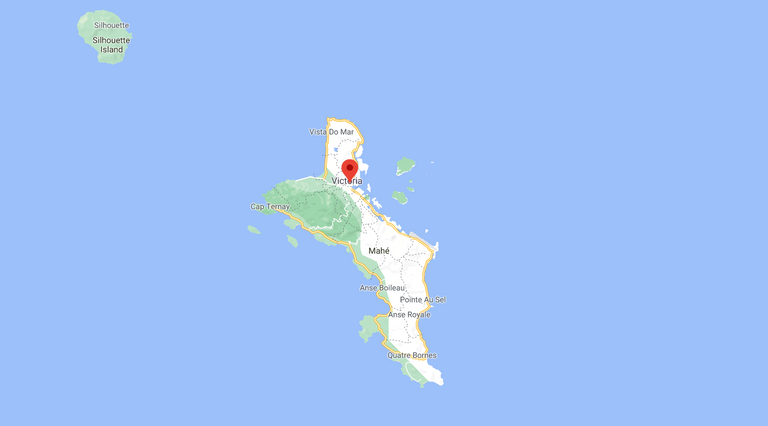
Interestingly (and ironically), HDR Global Trading Limited is located on Independence Avenue which is also home to the Central Bank of Seychelles.
Street view of the Central Bank of Seychelles:

Despite its shady origins, BitMex soon rose to the top of the exchange food-chain thanks to strong fundamentals.
First, until recently, access to trading on the exchange was permissionless. KYC was only introduced in August 2020 and BitMex has always adhered to a strict no-dollars, no-altcoins policy, only accepting deposits, settlements and withdrawals in Bitcoin. Although this would later come back to bite them, BitMex openness to offer trading to anyone holding Bitcoin was instrumental in its success.
Second, the exchange has a spotless security record. Solid security practices and the absence of a hot wallet have given BitMex a remarkable resistance to attacks since focusing on Bitcoin considerably diminishes the attack surface on the exchange.
Finally, BitMex has been very innovative on the product side. It pioneered perpetual swaps allowing Bitcoin holders to gain exposure to the volatility of altcoins without actually needing to hold any. Because no physical assets change hands on the platform (BitMex swaps "only mimic the exchange of cash flows and price performance of trading BTC/alts"), BitMex was the first exchange to be able to offer x100 leverage on margin trading.
The popularity of BitMex became such that it was later found out that up to 2018, the trading activity on the exchange was a leading factor in Bitcoin's price discovery. This fact was later decisive when the SEC rejected Bitwise's first rule-change proposal in favor of creating a Bitcoin ETF.
Things were going great for BitMex. Prompting increasingly brash behavior from its management. Arthur Hayes in particular has always carefully curated a cowboy image, appearing at major crypto events driving a Lambo and publishing incendiary pieces on the BitMex blog.
Then the hammer fell.
The Reckoning.
On Thursday October 1, 2020, the Commodity Futures Trading Commission (CFTC) dropped a bomb-shell:
The Commodity Futures Trading Commission has filed a civil enforcement action in the U.S. District Court for the Southern District of New York charging five entities and three individuals that own and operate the BitMEX trading platform with operating an unregistered trading platform and violating multiple CFTC regulations, including failing to implement required anti-money laundering procedures.
Among those charged are company owners Arthur Hayes, Ben Delo, and Samuel Reed, who operate BitMEX’s platform through a maze of corporate entities.
These entities, also named as defendants in the complaint, are HDR Global Trading Limited, 100x Holding Limited, ABS Global Trading Limited, Shine Effort Inc Limited, and HDR Global Services (Bermuda) Limited (BitMEX).
BitMEX’s platform has received more than $11 billion in bitcoin deposits and made more than $1 billion in fees, while conducting significant aspects of its business from the U.S. and accepting orders and funds from U.S. customers.
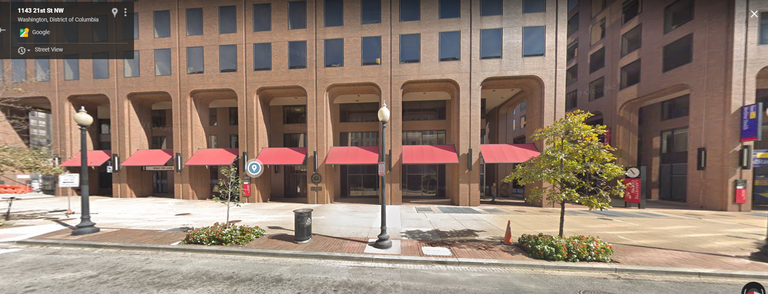
But the second shoe was yet to drop.
At about the same time that day, Audrey Strauss, the acting U.S. Attorney for the Southern District of New York made this announcement:
Arthur Hayes, Benjamin Delo, Samuel Reed, and Gregory Dwyer Flouted U.S. Anti-Money Laundering Rules.
Audrey Strauss [...] announced the indictment of Arthur Hayes, Benjamin Delo, Samuel Reed, and Gregory Dwyer (BitMex' first employee), charging the four with violating the Bank Secrecy Act and conspiring to violate the Bank Secrecy Act, by willfully failing to establish, implement, and maintain an adequate anti-money laundering (“AML”) program at the Bitcoin Mercantile Exchange or “BitMEX.”
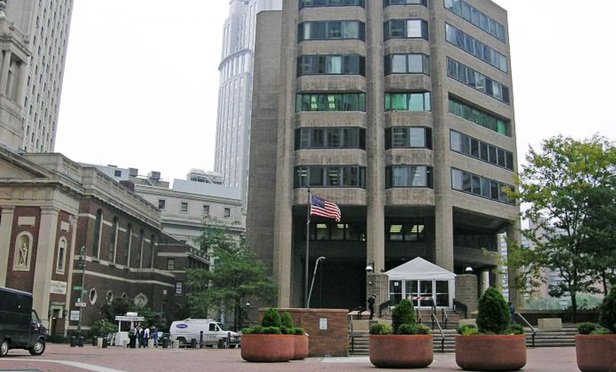
These charges are criminal charges that carry up to 5 years of prison per count (10 years total).
Sam Reed, the CTO, was arrested in Massachusetts while the others including Hayes remain at large.

In the indictment, the US attorney noted that:
BitMEX, which has long serviced and solicited business from U.S. traders, was required to register with the Commodity Futures Trading Commission (“CFTC”) and to establish and maintain an adequate AML program. AML programs ensure that financial institutions, such as BitMEX, are not used for illicit purposes, including money laundering.
Despite those obligations, HAYES, DELO, REED, and DWYER knew by no later than in or about September 2015 that, because BitMEX served U.S. customers, it was required to implement an AML program that included a “know your customer” or “KYC” component, but chose to flout those requirements.
While knowing of BitMEX’s obligation to implement AML and KYC programs because BitMEX was serving U.S. customers, HAYES, DELO, REED, and DWYER took affirmative steps purportedly designed to exempt BitMEX from the application of U.S. laws such as AML and KYC requirements.
For example, the defendants caused BitMEX and its parent corporations formally to incorporate in the Seychelles, a jurisdiction they believed had less stringent regulation and from which they could still serve U.S. customers without performing AML and KYC.
Indeed, in or about July 2019, HAYES bragged that the Seychelles was a more friendly jurisdiction for BitMEX because it cost less to bribe Seychellois authorities – just “a coconut” – than it would cost to bribe regulators in the United States and elsewhere.
For reference, here's a hilarious 2019 response from the chief executive of the Seychelles' Financial Services Authority (FSA), Dr Steve Fanny regarding the coconut comment.
"The word ‘coconut’ in that context simply meant that [BitMex] did not have to pay anything to come to Seychelles because coconuts are in abundance in Seychelles which is a tropical island.”
...
Let that sink in.
....
Dr Steve Fanny discussing the coconut-gate:

Source: http://www.nation.sc//articles/1289/fsa-clarifies-bribery-allegation-circulating-on-social-media
These charges are no joke and not to be confused with the recent waves of SEC settlements we've seen in the wake of the ICO craze of 2017/2018, latest of which a cease-and-desist order from the SEC aimed at SALT who raised 47 million in a 2017 ICO.
Because of their criminal element, they pose a serious threat of incarceration upon the accused.
The Impact.
The Bitcoin market immediately reacted to the news, dropping by around 2.5%.
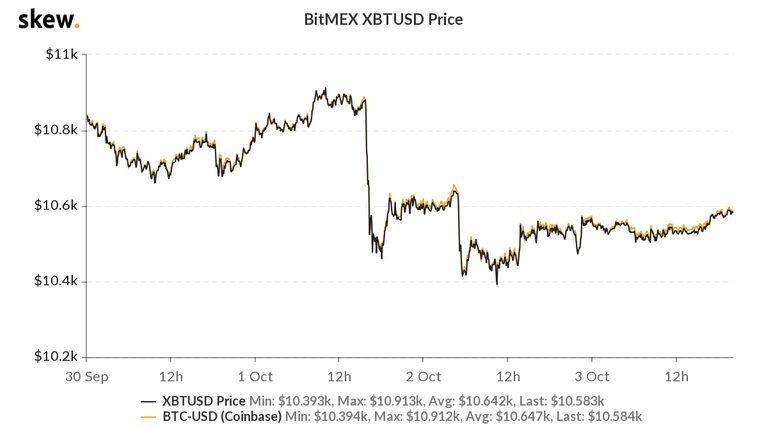
On BitMex, (US ?) users immediately proceeded to liquidate their positions and started the process of withdrawing their Bitcoin from the platform.
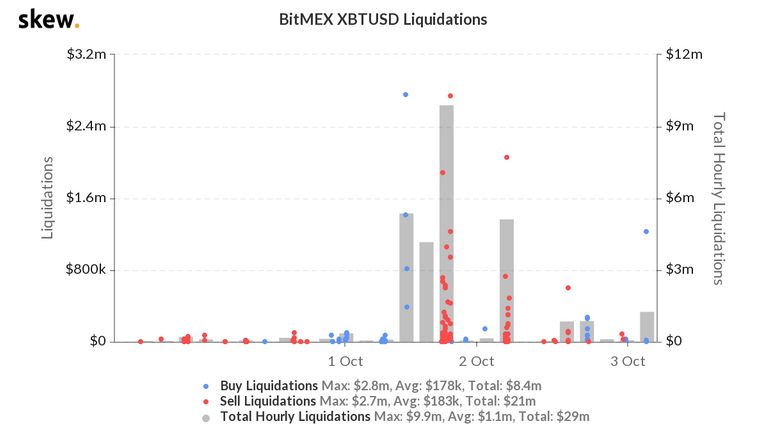
According to Glassdoor, 32,200 BTC (worth around $337 million) representing 19% of the exchange's total funds, were moved from BitMEX on Friday October 2.
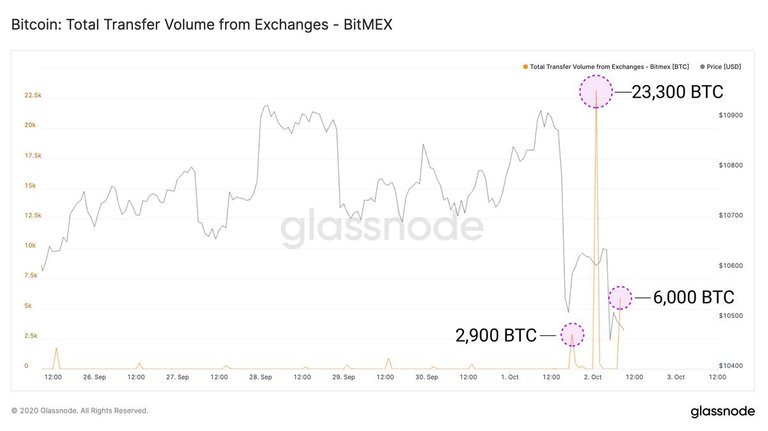
This story goes beyond BitMex though.
There's now real questions about the future of other unregulated offshore crypto exchanges known for servicing US customers like Deribit or Binance, the latter having been playing a game of jurisdictional arbitrage for years in order to keep its massive altcoin casino running.
As Nic carter noted in the lastest installment of On the Brink:
BitMex was very careful to sever any links to the US financial system, this is why they didn't have stablecoins on the platform because they didn't want to have those banks be pressured who maybe were custodying funds behind stablecoins, they wanted to remove that vector of control, which is why they only had Bitcoin deposit and withdrawals to fund their account.
A lot of other offshore exchanges or unregulated derivates exchanges are not that [careful], many of them are listing a number of assets, many of which arguably are unregistered securities.
Quite frankly,* I would be very concerned if I was running one of those BitMex competitors** or offshore exchanges. This demonstrate that the US believes that its jurisdiction is global.*
If you ever had US users on your platform or if you even booted them from the platform but you've been insufficiently diligent in restricting access and if you knowingly had them on the platforms through VPNs, the US authorities are going to assume complicity and knowledge.
However, there could be a silver lining to this story.
The Silver Lining.
The downfall of BitMex could actually benefit US-based regulated crypto derivatives exchanges like the CME, Bakkt and ErisX as liquidity from US BitMex traders might start to surge into these venues.
For now, it's unclear if this will be the case, BitMex has lost a considerable amount of volume but is still one of the biggest derivatives exchanges in crypto.
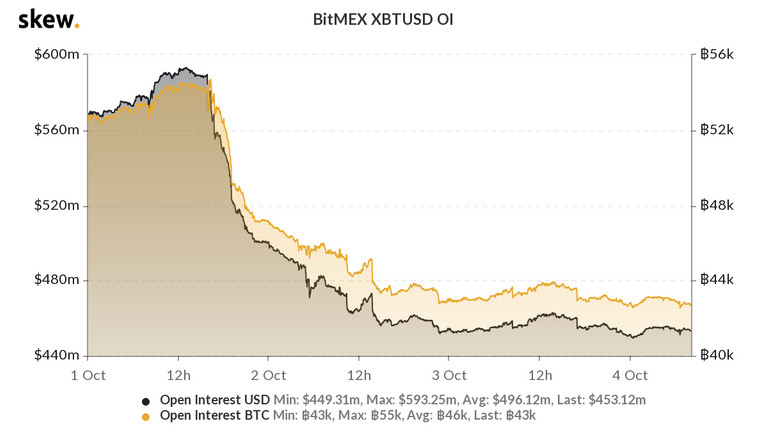
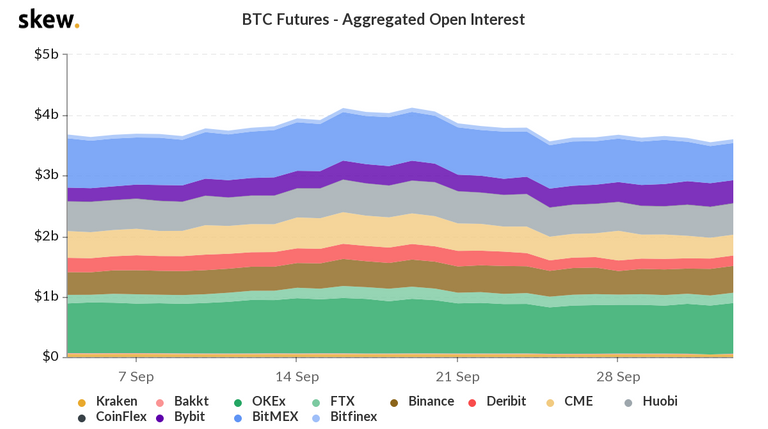
Another potential tail wind that could come out of this story regards the adoption of a Bitcoin ETF.
Back in 2017, the SEC rejected the first ever "Bitwise" Bitcoin ETF Trust proposed by Bitwise Investment Advisers, LLC and NYSE Arca. One of the basis for rejection regarded the fact that the proposed trust wouldn't be able to enter a surveillance-sharing agreement (AML/TF) with offshore derivatives markets (like BitMex) where most of the price discovery for Bitcoin was happening.
The SEC concluded this would expose the ETF to risks of having the price of its collateral manipulated from offshore venues, which for the commission was unacceptable.
Indeed, cleaning up the offshores derivatives crypto markets could a priori strengthen the case for an ETF once price discovery happens on regulated exchanges like the CME or Bakkt. This sentiment was echoed on twitter by the likes of Travis Kling from Ikigai Crypto Asset Management.
However, we're still a long way to go here.
Unregulated exchanges like Deribit still account for a substantial part of the total derivatives volume and it could be a while before the US regulators feel comfortable with the market as a whole.
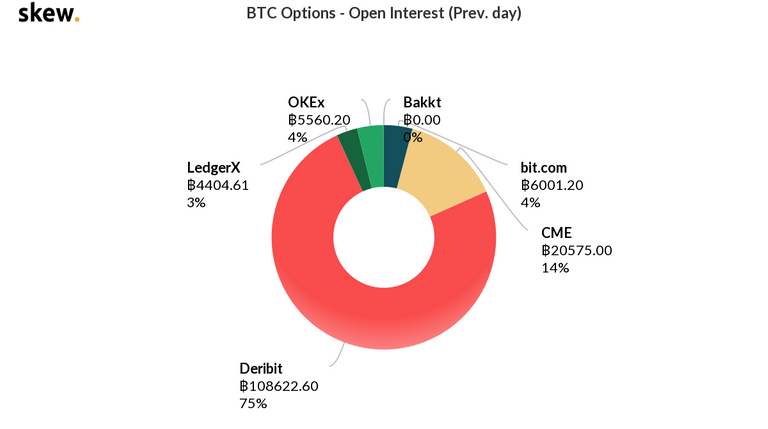
Another, more controversial, positive outcome was articulated by Fundstrat's Tom Lee who in a 2019 installment of On The Brink noted that the disappearance of BitMex would considerably alleviate some BTC sell pressure since BitMex needs to liquidate BTC (obtained as trading fees) to fund its operations.
The last point I'd like to leave you with is whether the slow wheel of justice will eventually crush KYC-less decentralized exchanges (looking at you UniSwap and UNI token). Despite their decentralized facade, many of these projects still have identifiable leaders, dev teams and bank accounts for payrolls which are all centralized points of failure and could be the target for enforcement action.
UNI token price:
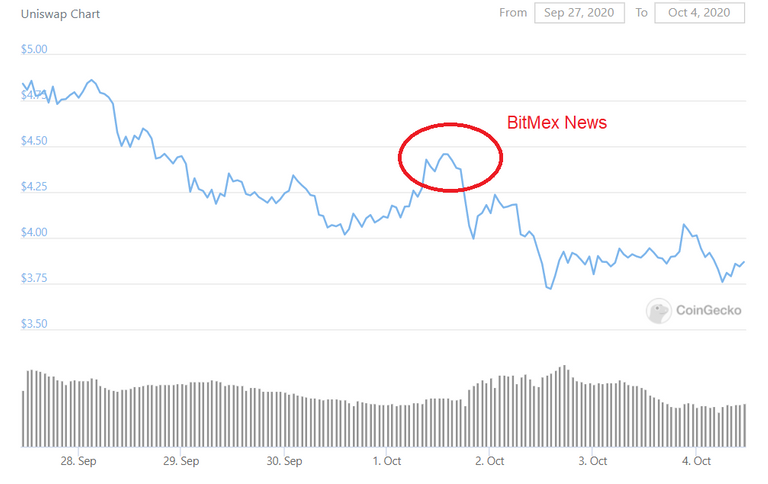
Source: https://www.coingecko.com/en/coins/uniswap
As usual time will tell but be sure that I'll keep you posted on future developments in a later edition of the blog.
See you next weekend for more market insights.
Until then,
🦊
@tipu curate
Upvoted 👌 (Mana: 18/27) Liquid rewards.
Thanks :)
Congratulations @f0x-society! You have completed the following achievement on the Hive blockchain and have been rewarded with new badge(s) :
You can view your badges on your board and compare yourself to others in the Ranking
If you no longer want to receive notifications, reply to this comment with the word
STOPDo not miss the last post from @hivebuzz: